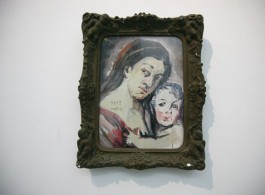[Press Release]
It is not proper to observe Zhou Yilun on the base of universal values, he, like an illegal person, expands his spheres and occupies undiscovered possibilities. Just like the person himself, he epitomizes a restless youth who loves doodling, photography and all kinds of extreme sports, to the point of being a chronicler of this society with his owns thoughts. All this is Zhou Yilun’s life and art. His studio is filled waste with materials, or maybe “rubbish”, he collects to leave us astonished in front of his attitude towards life and work environment, which are very different they are from those of the people who have already been naturally materialized and formulated. Zhou Yilun’s paintings show his “playful” nature and they reveal traces of society, politics, history and events in more direct and honest approaches intentionally triggering and guiding the audience. He likes to play with arts using various materials; he desires to expand constantly on the possibility of paintings however rationally pursuing the balances. Zhou Yilun never undertakes pleasure or pain in the game, just like his wisdom and seriousness in his paintings. “As there is Paradise in Heaven” is the title of this solo exhibition, which comes from the old proverb “Up above there is paradise, down below there are Suzhou and Hangzhou”; Zhou Yilun was born in Hangzhou and he lives and works in his birthplace. “Up above there is paradise” has several meanings and at the same time is a fuzzy concept to him. He wants to leave space to make this concept clearer and wider. With a questioning stance, he states that the beautiful imagery of ancient people, who looked at Hangzhou as an Utopian Place, has developed into politics, history, existence, time and even falsity; “up above there is paradise” can also be used to symbolize people’s dissatisfaction and spiritual reliance, or the very important place in religious stories.



